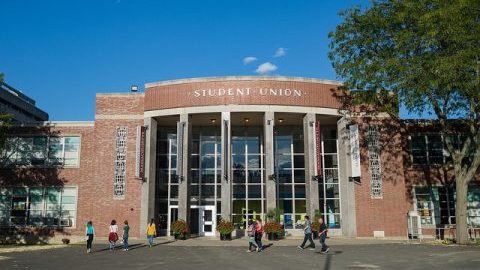The University of Massachusetts Student Government Association discussed restorative justice, textbook affordability and a new University Health Services and Center for Counseling and Psychological Health building among other topics during its weekly Senate meeting on Monday.
When cabinet reports were given, Attorney General Ilina Shah discussed continued plans for a restorative justice task force. The task force will be holding an educational event on Wednesday, Nov. 14 from 7 p.m. to 9 p.m. in the Commonwealth Honors College event hall.
According to Shah, the event will explore how conflict resolution relates to restorative justice “through dialogue and interactive activities.” Shah hopes to ingrain the idea of restorative justice within the community and local institutions.
“Our long-term goal is to establish a sustainable restorative justice program that is funded by the University and has ties to the local courts,” Shah said. “As part of this process, we hope to educate the campus community on restorative justice philosophy and practices.”
As noted by Vice President Nathalie Amazan in last week’s meeting, the concept of restorative justice calls for a change in how society views and handles wrongdoing. According to Amazan, where wrongdoing is currently seen in society as someone violating the law, restorative justice looks to see wrongdoing as a violation between relationships and people.
Later in the meeting, chair of the social justice and empowerment committee Timothy Scalona explained plans to help make textbooks and iClickers more affordable and accessible. Such plans include attempting to get professors to commit to recognizing the effects of the high costs of school materials.
“Whether that means by putting more PDFs online, recognizing that iClickers cost a ridiculous amount of money [or] just trying to find other ways to make the time here at college and the classes way more accessible for students so they don’t have to sacrifice food to buy their textbooks and iClickers,” Scalona said.
Scalona also discussed a campaign to increase wheelchair accessibility at UMass and a collaboration with Alpha Phi Omega and Greek Life to organize a food drive.
Later in the meeting, Gaurav Dangol, the Faculty Senate Representative, explained the House Council’s plan to create a new combined building for UHS and CCPH. Dangol explained that when the plan was brought up to the Administration, “they weren’t really prioritizing that at the moment, so there is talk of having a private company build the building and then rent it out to UMass.”
In his allotted speaking time, SGA President Timmy Sullivan showed appreciation for the work the SGA did to run early voting at UMass. He also noted his plan to work with organizations to write a letter of support on re-staffing the AmeriCorps VISTA position, which was previously held by Tassandra Rios-Scelso.
According to Sullivan, “Tassandra worked tirelessly with students to make sure we were addressing the issues of food insecurity on campus” and “the University did not re-staff this position.”
The letter is intended to look into why the University did not re-staff the position following Rios-Scelso’s completion and encourage the University to re-staff the position.
Following Sullivan’s discussion, Amazan addressed the SGA members concerning a project she has been working on to improve racial justice at UMass.
Amazan said, “Myself, a student from Melville and another undergraduate student are going through some of the different initiatives that the University is doing around diversity and inclusion, looking at what is happening right now, what can be changed, what needs to be improved and what we can improve so that we can have a holistic approach to racial justice on campus.”
Amazan also noted that the newly established social justice coalition will continue with a meeting this Friday.
The meeting concluded with various votes on administrative changes to SGA. The senators voted to appoint Senator Emma Kinney to the social justice and empowerment committee. Kinney is currently a part of the outreach and development committee and will sit on both committees.
Additionally, the SGA voted to allocate three open class of 2019 Senate seats to the classes of 2022, 2021 and 2020, with each class getting one seat.
The SGA will have its next meeting this Monday.
Editor’s note: Timothy Scalona is a columnist for The Massachusetts Daily Collegian.
Will Mallas can be reached at [email protected] and followed on Twitter @willmallas.





















amy • Oct 30, 2018 at 11:40 pm
How much of the student population is poor? Probably less than 10 percent.
Even for all of Umass’s obsession with ‘diversity’ it’s mostly Caucasian/white/European descent and that’s because the country is and also along with asians, white people perform high enough to get into a college more so than other groups. Some groups based on merit, only 1-3 percent would admitted into a college.
So it seems like a waste of our tuition and fees and also unfair for the SGA to be spending all of it’s efforts and money on a minority of the student population.